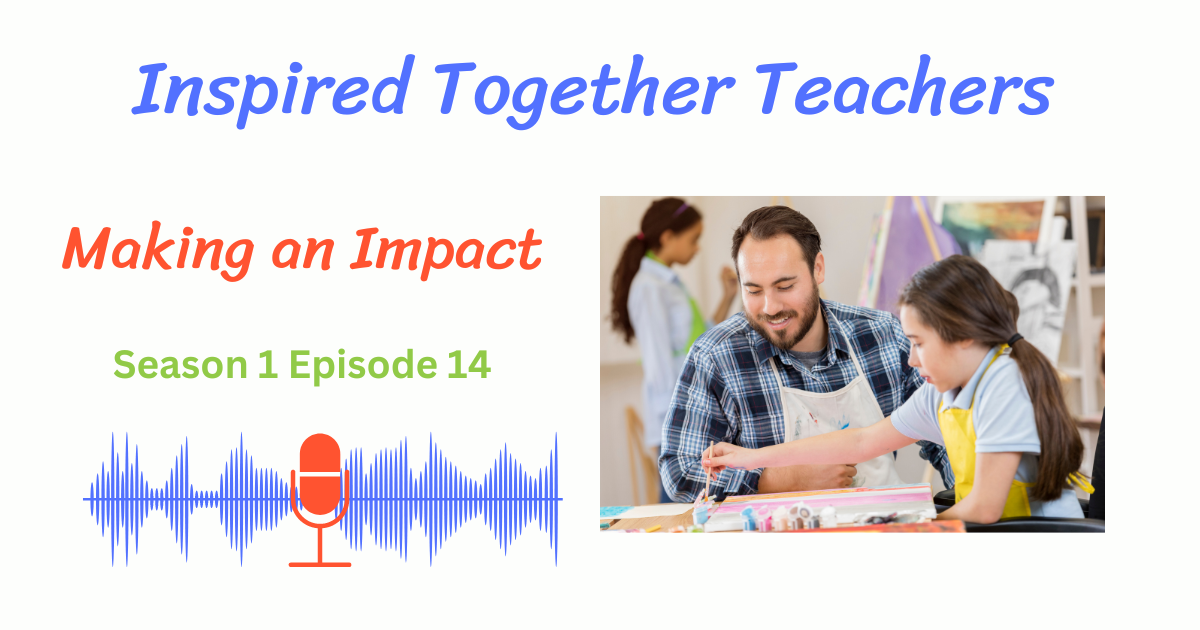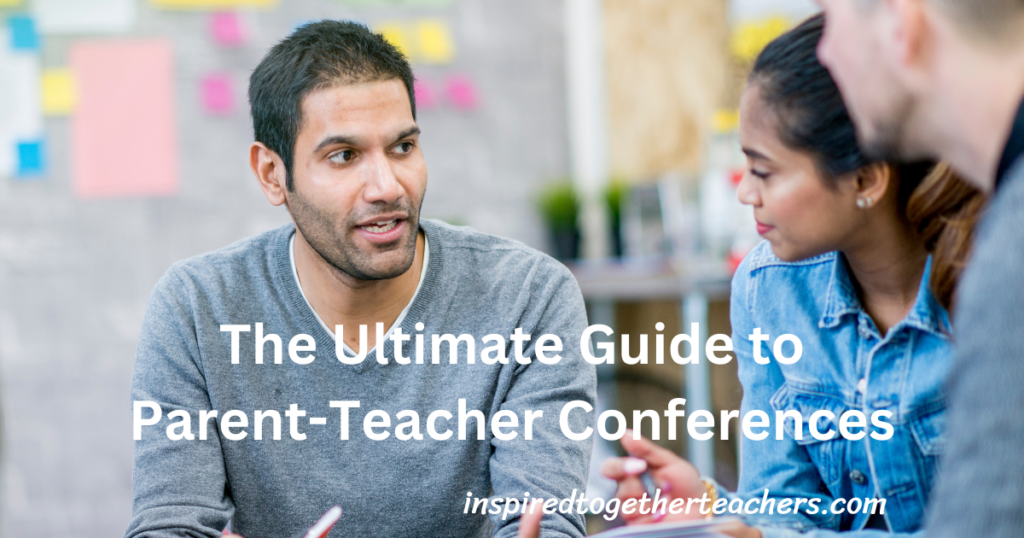Making an Impact S. 1 E. 14
Do you ever wonder if you are making an impact on your students? How do you know? In this episode we are talking about signs and signals you can be watching for to assure yourself that what you do is making an impact.
Show Notes:
Episode Summary:
Do you ever wonder if you are making a positive impact? You’ve been working really hard, yet it is human nature to question yourself. Does what I do matter? Do students even notice or care how much I am working for them? Does my family feel loved and cared for? Are my relationships with friends meaningful? In this episode we are talking about how to know if you are making an impact.
In this episode:
One of things we are all want to know is that our life and work have purpose and that we making a positive impact. Today, we’re going to explore what that might look like.
We all want to make an impact. It gives our life value and purpose. It brings us fulfillment- and we’re talking top of Maslow’s higher needs and self-actualization here.
When we know we are making an impact, we have the stamina to get through the tough times. We all have challenges, but sometimes, if we know that the result is going to make a positive impact, we can accept the challenges.
We know that questioning our impact can be an issue for teachers. We hear it at our workshops. Teachers question whether they are really making an impact. Teaching is unique because we can work on a project “a student” for 180 days and the results of our labor may not be recognized until months, years or even decades later….and we may never see that impact we made. However, there are signs and signals you can be watching for to assure yourself that you are making an impact. Let’s explore some now…….
How to Know If You Are Making an Impact With Your Students
Do you call students by name?
- We all want to feel seen.
- One of the simplest ways to make people feel noticed is to use their name. We all like to hear our names. How do you greet students in the morning? Do you great them by name? How do you respond to students when they raise their hands? Are you calling students by name when they are engaging in positive ways or only when they are exhibiting negative behaviors?
- If you are routinely connecting with students by using their names when you interact with them for a variety of reasons, you are already positively impacting them. They are feeling seen and heard.
- Example: when teachers stand in the door ways and great students by name when they enter the classroom
Dale Carnegie said about names: “Remember that a person’s name is to that person the sweetest and most important sound in any language.”
Do you give positive feedback?
- You are reading student work. You are having discussions with students both in a large group and in smaller groups or individually. You are answering student questions. These are all opportunities to give positive feedback. Even an incorrect answer can result in positive feedback.
- Here’s an example, “That is not the correct answer, but I can see that you have some good thinking going on.” You have just provided positive feedback.
- If you are giving students positive feedback on work, behaviors, attitudes, thought processes, or social interactions, you are making a positive impact.
Do you help students to grow?
- We all have a need for growth.
- Teachers are in a position to help students grow not only academically, but socially and emotionally as well.
- Do you meet students where they are academically and help them get to the next level?
- Do you guide students in appropriate social behaviors?
- Do you encourage students to have a growth mindset?
- Are you challenging students or encouraging them to try new things?
- If so, you are making a positive impact.
This is where students relationships enter the picture. When you have built relationships with students you can give them feedback that is personal. Or socially, you can remind a student this is not your best self- you can rise above this.
Paula’s example: When working with kids with cognitive or behavioral disabilities, sometimes it took a lot of repetition. We practiced, repeatedly, skills and behaviors until the students were able to learn them and then we would move on to the next goal. They often knew they weren’t at the same level as their peers. They didn’t need me to tell them. They felt it. However, what I could do for them was guide them as they got closer and closer and to be their biggest cheerleader along the way. Their steps were small but each step felt like a huge leap.
Do you teach the whole student?
- You were hired to teach academic content.
- You have all experienced teachers in your life who taught you something other than academic content.
- They recognized something in you and helped you to see it in yourself.
- They gave you advice about life, not just about homework.
- They opened your eyes to something you are passionate about but might never have discovered by yourself.
These teachers were teaching the whole person, not just the student. If your interactions with students sometimes move out of the academic realm and into student’s lives, you are making a positive impact.
Do you still care?
- This question is focused on you and your behaviors.
- We all know people who have called it in. They do the minimum to get by. They stop any extra interactions. They don’t go out of their way to do anything extra for a student or colleague. They have a negative attitude. A student failed? Not my problem. A parent called? Why should I bother to call them back? Faculty meeting? I’m not going to show up.
- You don’t have to work yourself into the ground, and you don’t have to be on call 24/7.
- Good teachers still care. If there is a way to help a student, they will show up for that student.
Do you still care about your students? If so, you are making a positive impact.
You make more of an impact than you may realize.
In our experience, teachers make far more of an impact than they realize. Your student may be walking away with an important life lesson. A seemingly ungrateful parent may recognize the ways you have helped their child, though they may never tell you. It is a truth in life that you may never know who or how you may have made a positive impact.
You may not know the impact you have on a student. Some will never get the chance to tell you. Some will show up years later and surprise you.
Save the evidence: Positive Notes for Days I Really Need Them
Save those notes and cards and letters, and little gifts you get. There will always be there to remind you that you make a difference.
Michele’s room is filled with little reminders from students. I’m sure people come into my room and think I have a lot of worthless clutter. In reality, it is the cat a student made for me in wood shop, the butterfly pin with my name misspelled that a student bought me with his own money, the cup that holds my colored pencils that a student gave me 20 years ago. I don’t see it as junk. I see it as impact.
We recently worked with a high school teacher that had a student mementos wall in his classroom. He hung class pictures, newspaper articles about the sports wins, student artwork, graduation party invitations…anything students gave him. He said, “that wall reminds me why I do this.”
We all need those reminders.
How do you know you are making a difference with your family and friends?
- People come to you to seek your advice or as a shoulder to cry on- they trust you. You don’t judge and love unconditionally.
- You are a good listener. You are present.
- You show up, emotionally even if others don’t always show up for you. Especially true of family members who don’t have the same level of maturity or goals that you do.
- You show up physically.
- You go to the funerals. There is a great episode of NPR’s podcast This I Believe where a woman shares how a teacher showed up for her Mom’s funeral, when she was an adult, and that it mattered.
Recap: There may be times when you question if you are making an impact. While it is human nature to question ourselves, you are making more of an impact than you know. You are making an impact in the classroom through your words and actions. The same applies to your home life. Though you may never be fully aware of the impact you are making, continue to care, to teach, and to positively impact those around you. You are more powerful than you know.
Quotes:
“Remember that a person’s name is to that person the sweetest and most important sound in any language.”
Dale Carnegie
“You cannot get through a single day without having an impact on the world around you. What you do make a difference, and you have to decide what kind of difference you want to make.”
Jane Goodall
Resources mentioned in this episode:
NPR Radio Program/Podcast This I Believe: Always Go to the Funeral
Related episodes and posts:
5 Ways to Know if You are Making an Impact – Inspired Together Teachers
Positive Notes for Days You Really Need Them
Connect with Inspired Together Teachers:
Download our FREE resource, The Inspired Teachers Guide to Taking Back Your Life.
Website: https:www.inspiredtogetherteachers.com
Instagram: Inspired-Together-Teachers
Facebook: Inspired Together Teachers
Facebook Teacher Warriors Group: Teacher Warriors Facebook Group
Linked In: https://www.linkedin.com/company/inspired-together-learning/
Our book: The Inspired Teachers Journal: A Weekly Guide to Becoming Your Best Self
More About Inspired Together Teachers:
Are you a teacher struggling to balance your best work with your best life?
If you are dedicated and caring but often overwhelmed and exhausted, join us at Inspired Together Teachers. We’ll give you inspiration, strategies and tips that help you navigate life’s challenges as a stronger, more confident, and more joy filled person, both in and out of the classroom.
Inspired Together Teachers will give you practical tools to experience more of what matters most in your life.
Co-hosts Paula Schmidt and Michele Vosberg are award winning educators with the experience and skills to help teachers thrive in life and work. They’ve taught at all levels, worked with thousands of teachers, and conducted workshops around the world. They are also the authors of the #1 best-selling book The Inspired Teachers Journal: A Weekly Guide to Becoming Your Best Self.
Paula and Michele would love to have you to join them on their quest to lived inspired lives.






